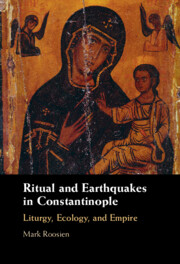Book contents
- Ritual and Earthquakes in Constantinople
- Ritual and Earthquakes in Constantinople
- Copyright page
- Dedication
- Contents
- Figures and Maps
- Acknowledgments
- Abbreviations
- Introduction
- Chapter 1 Earthquakes and Liturgy
- Chapter 2 Earthquakes and Emperors
- Chapter 3 Beyond Divine Chastisement
- Chapter 4 Earthquakes and the Saints
- Chapter 5 Beyond Commemoration
- Conclusion
- Book part
- Bibliography
- Index
Chapter 3 - Beyond Divine Chastisement
Constantinople as a Site of Blessing
Published online by Cambridge University Press: 05 December 2024
- Ritual and Earthquakes in Constantinople
- Ritual and Earthquakes in Constantinople
- Copyright page
- Dedication
- Contents
- Figures and Maps
- Acknowledgments
- Abbreviations
- Introduction
- Chapter 1 Earthquakes and Liturgy
- Chapter 2 Earthquakes and Emperors
- Chapter 3 Beyond Divine Chastisement
- Chapter 4 Earthquakes and the Saints
- Chapter 5 Beyond Commemoration
- Conclusion
- Book part
- Bibliography
- Index
Summary
This chapter examines the ways in which Byzantine political and ecclesiastical elites recast local earthquakes as divine blessing upon the city rather than manifestations of divine wrath as evinced in the liturgical commemoration rite. First, it examines a legend that arose in connection with the earthquake of 438 that framed it as a divine theophany. Following the divisive Council of Chalcedon in 451, ecclesiastical authorities in Constantinople’s imperial church used the legend against their miaphysite opponents to cast the quake as divine approval of Constantinople’s political and theological claims. Next, it turns to the earthquake of 557, which partially destroyed the famous church of Hagia Sophia built by the emperor Justinian in 537. Justinian rebuilt the church in 562 and held an elaborate ceremony complete with a liturgy of rededication for the church. This ceremony and its liturgy eschewed the theology of divine chastisement and framed the quake as a temporary setback, an opportunity for Justinian to display his prowess over the destructive effects of nature by rebuilding the church to be more magnificent than before.
Keywords
- Type
- Chapter
- Information
- Ritual and Earthquakes in ConstantinopleLiturgy, Ecology, and Empire, pp. 75 - 107Publisher: Cambridge University PressPrint publication year: 2024

